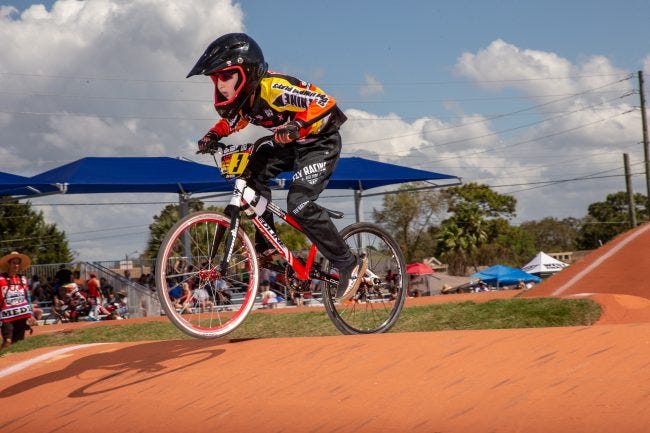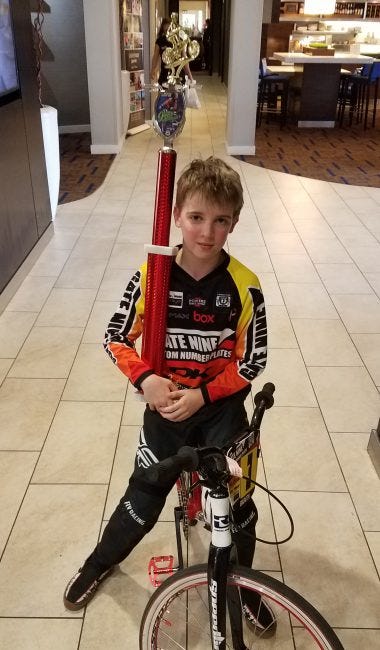Weekly Roundup: Down, But Not Out, In Florida Edition
It wasn't until after I ran down from the starting hill and down to the track's end that I realized my son had been injured. I carried his twisted bike off the track as he stood on wobbling legs and stumbled into the darkness past fence before sitting down. Then I sat down next to him and observed the way he shielded his face with his hands, helmet still on.
"Come on, let's stand up and walk over to the trophies," I said, mistaking his behavior for disappointment or stubbornness.
"I can't," he replied, "I want to, but my head hurts so much."

It was our first flyaway race, a ninety-five degree scorcher just outside Tampa. We arrived Saturday morning to find that the other children in John's class hadn't even bothered to show up for practice. They'd all been in the previous day's pre-race, presumably because their mothers didn't prioritize yet another day at school over being prepared for the 25-mph dive from a thirty-five-foot-tall starting hill, so they'd be arriving fresh at noon while we sweated out the aftereffects of an 8:30AM lapping session. Even so, John won the first moto by thirty-five feet, looking confident despite the heat and a lack of familiarity with the track.
Leading the main, he was deliberately knocked off his bike about fifty feet from the finish line by a child who was nearly a head taller than he was. The mother looked at me as I was carrying John's bike away "Es illegal?" Yes, lady, es illegal. She shrugged. The father of the boy who had hit my kid down was nowhere to be seen. I had the paramedics check John out. No concussion --- his Bell Sanction helmet was dented and scratched, and his head hurt from where the visor had shoved the liner into his forehead, but he would be fine. His shoulder was bleeding a bit. His bike was twisted and bent. That night I straightened what I could and adjusted the rest.
The next morning I let him skip the first moto, figuring there was no sense putting him in harm's way again. He took second place in the second moto, transferring to the main event. I don't want to talk too much about what happened before the main event. The mother and a friend of hers conspired to intercept John as he was going up the starting hill. They told him he was ineligible to race. He assumed the adults were being honest and he rode away. I saw him leave, caught up to him, got the story, and returned him to the gate. Then I proceeded to be extremely unpleasant to a few people. I can't hate the child who knocked John over, even though he knew he'd done wrong. These are children. For the mother, however, I have complete and total contempt. What kind of person conspires to intimidate, and lie to, a nine-year-old? The father, of course, wasn't there. We never saw him. I assume that after impregnating a horse-faced virago under the influence of crystal meth he had promptly peaced-out to the next trailer park, leaving his baby momma and spawn to surf effortlessly on a wave of public assistance drawn from my most recent IRS-audit judgment.
In the main, the big kid swerved at John a bunch of times and while he was doing so, another boy snuck past him and took the win. John avoided his would-be assailant and grabbed third place. He wasn't happy with his performance, but I was thrilled he'd crossed the line without further injury. I took him to Clearwater Beach and rented him an inflatable boat, towing him out to the buoys and then letting him ride the waves back to the shore. On the track, he had looked like a racer, like a competitor. At the race, this whole drama had possessed life-and-death seriousness. At the beach, he was just a little boy having fun.
It would be unwise for me to ask too much of him in the months and years to come. If you put the flame to steel you will temper it, but if you heat it too much you'll render it worthless. The problem is that you need experience to know the difference, and I have just this single chance. Afterwards, I expressed my pleasure that he'd made it through the second day. "In the morning," he told me, "I thought about not racing, but this is very important to me and I'm not a quitter, so I decided I should try to make the main, even if I was scared about getting hurt again."
"Well, if you're not going to quit," I replied, "then neither will I." And I thought about a moment where I'd seen him riding a head-high wave in his little boat, all the way to the shore, and the unaffected joy on his face in that moment. Not the joy of victory, not the pleasure of mastery, just the happiness of childhood. We are running the clock out on this childhood, on these moments, melting the wax from a mold to reveal the pain-forged shape within. On the airplane he rubbed his shoulder and winced from the rawness of the wound. Then he turned his head to me, to see if I'd noticed his weakness, however temporary, however justified. I was looking out the window, into the blank night, pretending to see something more important than that.

* * *
This week, for Hagerty, I wrote about crew-cab pickups.

